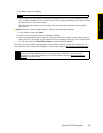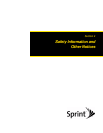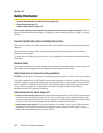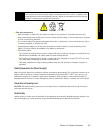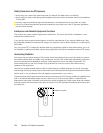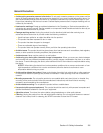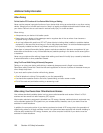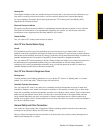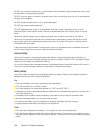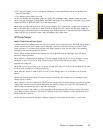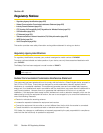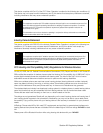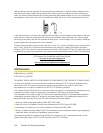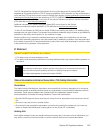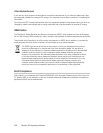
Section 4A. Safety Information 197
Safety Information
Hearing Aids
Some digital wireless phones may interfere with some hearing aids. In the event of such interference, you
may want to consult your service provider, or call the customer service line to discuss alternatives.
For more regulatory information about hearing devices, see “FCC Hearing-Aid Compatibility (HAC)
Regulations for Wireless Devices”.
Electronic Devices in Vehicles
RF signals may affect improperly installed or inadequately shielded electronic systems in motor vehicles.
Check with the manufacturer or its representative regarding your vehicle. You should also consult the
manufacturer of any equipment that has been added to your vehicle.
Posted Facilities
Turn your device OFF where posted notices so require.
Turn Off Your Device Before Flying
Aircraft
FCC regulations prohibit using the transmitting and phone functions of your device while in the air. In
addition, most airline regulations prohibit the on-board use of portable PCs (and all other portable electronic
devices that could potentially emit stray RF energy), particularly during take-offs and landings, to prevent any
possible interference with the reception of signals by airborne electronic navigational devices.
Turn your device OFF before boarding an aircraft. Always request and obtain prior consent and approval of
an authorized airline representative before using your device aboard an aircraft. Always follow the
instructions of the airline representative whenever using your device aboard an aircraft, to prevent any
possible interference with airborne electronic equipment.
Turn Off Your Device in Dangerous Areas
Blasting Areas
To avoid interfering with blasting operations, turn your device OFF when in a “blasting area” or in areas
posted “Turn off two-way radio”. Obey all signs and instructions.
Potentially Explosive Atmospheres
Turn your device OFF when in any area with a potentially explosive atmosphere and obey all signs and
instructions. Sparks in such areas could cause an explosion or fire resulting in bodily injury or even death.
Areas with a potentially explosive atmosphere are often, but not always, clearly marked. They include fueling
areas such as gas stations; below deck on boats; fuel or chemical transfer or storage facilities; vehicles
using liquefied petroleum gas (such as propane or butane); areas where the air contains chemicals or
articles, such as grain, dust, or metal powders; and any other area where you would normally be advised to
turn off your vehicle’s engine.
General Safety and Other Precautions
Your device is a high quality piece of equipment. Before operating, read all instructions and cautionary
markings on the product, battery and AC phone charger.
Failure to follow the directions below could result in serious bodily injury and/or property damage due to
battery liquid leakage, fire or rupture.



